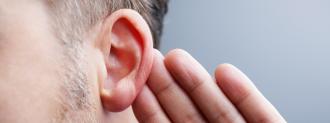By now, we all know the most common ways the coronavirus affects patients — fever, fatigue, trouble breathing, lost sense of smell, etc.
Now, a newly published case study has shone a light on a potential link between COVID-19 and another health problem: sudden hearing loss.
Thus far, hearing loss from COVID-19 has only been reported in a handful of patients, but the authors say that doctors need to be aware that it’s a possible complication of COVID-19 — because there are ways to reverse the hearing loss, if it’s caught soon enough.
Sudden Hearing Loss From COVID-19
The new case study, published in the journal BMJ Case Reports, highlights a 45-year-old British man who appeared to experience sudden hearing loss from COVID-19.
The man was hospitalized for a severe COVID-19 infection, during which he spent 30 days on a ventilator. Doctors treated him with steroids, convalescent plasma, and an antiviral medication before he finally started to improve.
About 10 days after doctors took the man off the ventilator and moved him out of the ICU, he noticed a ringing in his left ear, followed by a sudden loss of hearing in it.
The man had never experienced any problems with his hearing before, and prior to the coronavirus infection, his only health issue was asthma. After the doctors treated him with steroids, he partially regained his hearing in the ear.
Process of Elimination
Doctors didn’t see any blockage or inflammation in the man’s ear canal that might have prompted the sudden hearing loss. They also ruled out the flu, HIV, and rheumatoid arthritis as the cause of it.
Based on their testing, they determined the culprit was likely damage to his middle ear, his hearing nerve (located in the inner ear), or a combination of both.
They also have a theory about how the coronavirus might have caused this damage and why their treatment helped restore the man’s hearing.
“It is possible that the Sars-Cov-2 virus enters inner ear cells and brings about cell death, and/or causes the body to release inflammatory chemicals called cytokines that can be toxic to the inner ear,” co-author Stefania Koumpa told the Guardian.
“Steroids likely help by reducing inflammation and therefore production of cytokines,” she continued.
Keeping an Eye on the Ears
The British man was the first reported case of hearing loss from COVID-19 in the U.K., but not the first worldwide — that would be an older female in Thailand, whose case was reported in April.
Since then, researchers in Iran, Turkey, and Egypt have reported patients experiencing hearing loss either during or after a COVID-19 infection.
It is possible that the coronavirus enters inner ear cells and brings about cell death.
Stefania Koumpa
A report published in the journal JAMA Otolaryngol in July, meanwhile, appears to support the theory that it is the coronavirus causing this hearing loss in some way.
Researchers from Johns Hopkins Medicine describe examining three cadavers of people who died of COVID-19 — and finding the coronavirus in the middle ear and part of the skull bone right behind the inner ear (the mastoid) in two of them.
Despite these reports, it does appear that hearing loss from COVID-19 is rare. However, losing hearing in even one ear can dramatically affect a patient’s quality of life, according to Koumpa.
She and her colleagues urge ICU doctors to ask COVID-19 patients if they’re experiencing any changes to their hearing and get them treatment while there’s still time to prevent the sudden hearing loss from becoming permanent.
We’d love to hear from you! If you have a comment about this article or if you have a tip for a future Freethink story, please email us at [email protected].






